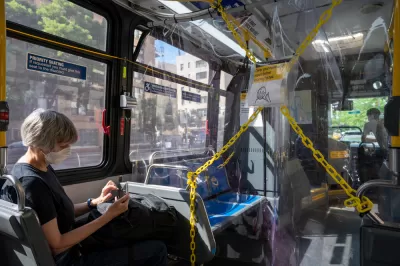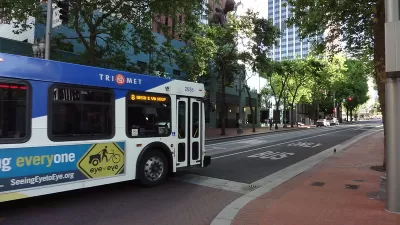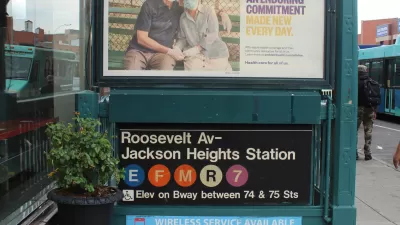A group of 12 leading transit experts debriefed on the consequences of the pandemic for public transit, and proposed a future that centers public transit as a tool for economic recovery and righting the past wrongs of the planning profession.

"Covid-19 wreaked havoc with America’s public transportation networks," writes Tanya Snyder to introduce the proceedings of a recent panel discussion between 12 leading transit experts on the future of public transit in the post-pandemic world.
"Empty buses and train cars were a good sign, at first, that people were heeding calls for social distancing," continues Snyder. "Within weeks, we realized that grocery employees and hospital workers, renamed “essential workers” and lauded as heroes, were struggling to get to work as the transit systems they relied on cut schedules. People found it hard to make essential trips and access medical care. It turned out that even during a lockdown, public transportation is the artery through which the lifeblood of cities flows."
The cultural and economic position of public transit evolved constantly during the pandemic, and the likelihood that the future of public transit is likely to be a source of political consternation and technological innovation inspired Politico to gather a panel of 12 leading transit advocates, planners, system designers, and government officials from around the world for a two-hour zoom discussion about the future of transit.
The discussion started with a recap of the major events and themes of transit during the pandemic (e.g., "widespread service cuts," disparate impacts, migration, disappearing rush hour, and "hub-and-spoke systems became obsolete"). The second part of the discussion focused on how to "future-proof" public transit for life after COVID. The subheadings of the part of the discussion are listed below, with more details provided in the source article:
- It's time to end transit red-lining
- Refocus on bus service
- Detangle jurisdictions
- Make driving worse
- Revamp data systems
FULL STORY: Policy Hackathon: Can public transit recover from Covid-19?

Planetizen Federal Action Tracker
A weekly monitor of how Trump’s orders and actions are impacting planners and planning in America.

Maui's Vacation Rental Debate Turns Ugly
Verbal attacks, misinformation campaigns and fistfights plague a high-stakes debate to convert thousands of vacation rentals into long-term housing.

San Francisco Suspends Traffic Calming Amidst Record Deaths
Citing “a challenging fiscal landscape,” the city will cease the program on the heels of 42 traffic deaths, including 24 pedestrians.

Amtrak Rolls Out New Orleans to Alabama “Mardi Gras” Train
The new service will operate morning and evening departures between Mobile and New Orleans.

The Subversive Car-Free Guide to Trump's Great American Road Trip
Car-free ways to access Chicagoland’s best tourist attractions.

San Antonio and Austin are Fusing Into one Massive Megaregion
The region spanning the two central Texas cities is growing fast, posing challenges for local infrastructure and water supplies.
Urban Design for Planners 1: Software Tools
This six-course series explores essential urban design concepts using open source software and equips planners with the tools they need to participate fully in the urban design process.
Planning for Universal Design
Learn the tools for implementing Universal Design in planning regulations.
Heyer Gruel & Associates PA
JM Goldson LLC
Custer County Colorado
City of Camden Redevelopment Agency
City of Astoria
Transportation Research & Education Center (TREC) at Portland State University
Jefferson Parish Government
Camden Redevelopment Agency
City of Claremont





























